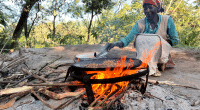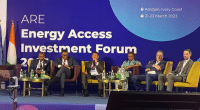Akinwumi Adesina, President of the African Development Bank (AfDB) Group, pledged to mobilise $2 billion for access to clean cooking in Africa over the next 10 years at the Clean Cooker Summit in Paris, France, which came to a close last week.
Last week, clean cooking was at the heart of a high-level event in Paris, France. It was the Africa Clean Cooker Summit, co-chaired by French President Emmanuel Macron, Samia Suluhu Hassan, President of the United Republic of Tanzania, Jonas Gahr Støre, Prime Minister of Norway, Akinwumi Adesina, President of the African Development Bank (AfDB) Group and Fatih Birol, Executive Director of the International Energy Agency (IEA).
At this historic summit devoted to clean cooking, the President of the AfDB announced his institution’s commitment to devote 2 billion dollars over the next 10 years to access to clean cooking. This corresponds to 200 million dollars per year. The AfDB thus becomes the first development finance institution to include clean cooking among its priorities in Africa.
Deforestation and pollution
This is an issue with economic, climate and health implications. “Access to clean cooking is more than a question of cooking, it’s a question of dignity… It’s much more than lighting the cooker, it’s an existential question. It’s about fairness, justice and equality for women”, said Akinwumi Adesina. Currently, 1.2 million Africans continue to cook their food with charcoal or wood fires.
As a result, 200 million hectares of forest, including 110 million in Africa, are threatened by the climatic effects of cooking with charcoal, biomass and wood, according to IEA figures. Among the African countries most affected by deforestation linked to charcoal production is the Democratic Republic of Congo (DRC).
Read also- What innovative financing is needed to unlock access to clean cooking in Africa?
In this country at the heart of the Congo Basin, trees are felled in droves for charcoal production, including in the Virunga National Park. According to the Development Innovation Fund (DIF), charcoal is the source of energy for 90% of the population in the east of the DRC. Faced with this crisis, which affects most sub-Saharan countries, Tanzanian President Samia Suluhu Hassan called at the Paris summit for “a generous replenishment of the African Development Fund (ADF), including 12 billion dollars for clean cooking”.
The commitment of France and Norway
For his part, French President Emmanuel Macron has promised to invest “€100 million over five years in clean cooking solutions and to mobilise more through the Paris Pact for People and Planet and Finance in Common”. Norway is expected to contribute $50 million.
Despite the pledges of $2.2 billion made in Paris, much remains to be done to achieve universal access to clean cooking in Africa, especially as 1.2 billion Africans continue to cook their food on wood fires or other fossil fuels. As a result, “over 10 years, 6 million people, mainly women, will die prematurely. This is unacceptable”, said the AfDB President in Paris. We need to invest 8 billion dollars every year in Africa to achieve universal access to clean cooking. We are still a long way from achieving this.
Jean Marie Takouleu







